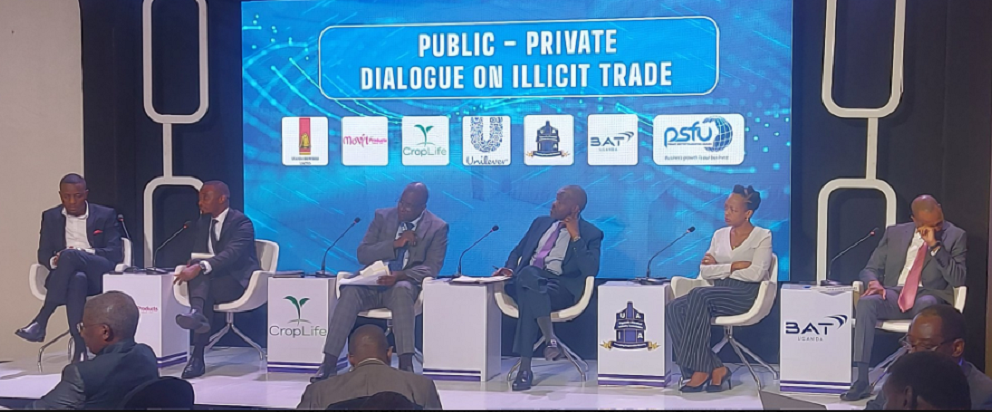Stakeholders on the panel discussion on illicit trade
Stakeholders in the beverages and alcohol sector say Uganda is losing Shs2 trillion annually in illicit alcohol trade.
This revelation comes as Private and Public Sector players convene to discuss how to avert illicit trade.
Speaking at the public-private sector dialogue on illicit trade in Uganda held Thursday morning at Serena Hotel, Kampala, Juliana Kaggwa, a member of Uganda Alcohol Industry Association, who also doubles as the Corporate Relations Director at Uganda Breweries Limited, said illicit alcohol space has been growing at 9% for the last five years. She says that 65% of alcohol produced in Uganda is unregistered and does not pay tax.
“Only 35% of us are paying taxes. It is alarming; we are leaving money on the table. We are risking lives of the young people,” Kaggwa said, adding Uganda loses over Shs2 trillion in revenue annually due to illicit alcohol trade.
The event has been organized by the Private Sector Foundation Uganda (PSFU) in conjunction with Uganda Breweries Ltd, BAT, Unilever, Movit Limited, and Uganda Alcohol Industry Association among others.
PSFU Executive Director, Stephen Asiimwe said illicit trade impacts several areas of the economy.
He recommends enforcement and engagement in a bid to curb the vice.
Joseph Enyimu, a Commissioner in the Ministry of Finance, who represented the Permanent Secretary, said that the country is building a competitive economy, which he says means that “you build a tradable sector.”
Enyimu says there is need to formalize, legitimize and structure the trading space. According to Enyimu, illicit trade thrives on grounds of informal sector, yet it (informal sector) contributes 51% to the GDP and accounts for 88% of the workforce.
He revealed that Finance Ministry is committed to fighting illicit trade by ensuring traceability of products.
“We are here to listen to issues put on table and what we can do better. I pledge collaboration and partnerships with Finance Ministry to bring this vice to an end,” Enyimu said.
Speaking at the engagement, David Ebiru, the Executive Director at Uganda National Bureau of Standards (UNBS) said that the Bureau is using carrot and stick approach to persuade people to become self regulated.
“Illicit trade is within our control. All we need is to take the next step,” Ebiru said.
He added that the illicit traders have taken the advantage of the poor and the ignorant.
“If you don’t have a market, you can’t thrive,” he said, adding that there is a need to unearth the market from which illicit traders are trading and whose businesses they are.
Sam Watasa, the Chair, PSFU Trade Core Team, however, says that everything is in place to stop illicit trading. He notes that what is lacking is coordination and implementation.
Presiding over the engagement as Chief Guest, the State Minister for Trade David Bahati said “we need to take this matter seriously.”
He admitted that coordination and implementation remain a challenge but noted that UNBS needs resources to solve the problem of enforcement. He appealed to stakeholders to give information to Uganda Revenue Authority (URA) for purposes of enforcement. Bahati pledged government support in fighting illicit trade.





